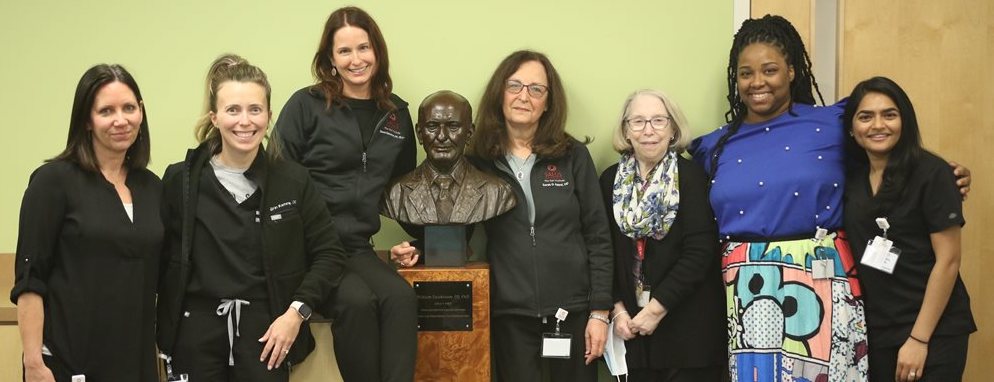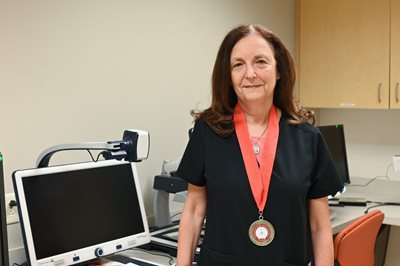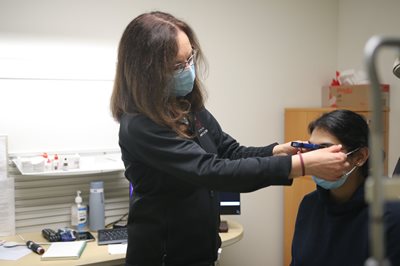
Erin Kenny, OD ‘15, Resident ‘16, FAAO, was a fourth-year student in the low vision rotation at the Pennsylvania College of Optometry (PCO) at Salus when she first met PCO/Salus professor Sarah Appel, OD ‘79, Resident ‘81, FAAO, AAO Diplomate, Low Vision Rehabilitation ‘90.
Because Dr. Appel was strictly clinical, students oftentimes didn’t meet her until their fourth year.
“It sounds very dramatic, but she changed my life. I thought I was going to be a contact lens specialist,” said Dr. Kenny, now chief of the William Feinbloom Vision Rehabilitation Center housed at The Eye Institute (TEI). “Then I did the low vision rotation with Dr. Appel, and she made me fall in love with low vision. She was so intelligent and approachable. But it was her passion that made me realize low vision was what I wanted to do.”
 Looking back on her 40-plus years at the Feinbloom Center, Dr. Appel tells a similar story. And, now that she’s officially retiring, effective May 2023, as the director of the Pediatric Low Vision Services at TEI and co-director of the Special Populations Assessment and Rehabilitation Center (SPARC) program for children with visual and developmental disorders, she’s had a chance to reflect on her passion to help those with visual impairments, which initially developed during her PCO residency in the early 1980s.
Looking back on her 40-plus years at the Feinbloom Center, Dr. Appel tells a similar story. And, now that she’s officially retiring, effective May 2023, as the director of the Pediatric Low Vision Services at TEI and co-director of the Special Populations Assessment and Rehabilitation Center (SPARC) program for children with visual and developmental disorders, she’s had a chance to reflect on her passion to help those with visual impairments, which initially developed during her PCO residency in the early 1980s.
“It was a uniquely rewarding experience to work within an interdisciplinary rehabilitation team, to address the goals of adults and children with visual impairments and to practice holistic healthcare,” said Dr. Appel. “I think that passion was communicated to the (optometric) interns and residents by the staff, and it all gelled for me during my residency. I wanted to share that with future generations of optometry students and residents.”
Richard Brilliant, OD ‘76, FAAO, AAO Diplomate, department chief at the time, current professor emeritus, along with Randall Jose, OD, FAAO, William Feinbloom, OD, PhD, FAAO, and Audrey Smith, PhD, CLVT, COMS, MEd , professor emerita, helped to develop the interdisciplinary low vision rehabilitation program at PCO. Dr. Brilliant, who was widely respected within the field of Low Vision Rehabilitation, asked Dr. Appel if she would like to work at the Feinbloom Center.
Dr. Appel jumped at the opportunity.
“It was a dream come true for me,” she said about being able to fulfill her innate passion.
There were a lot of exciting things happening then at PCO as the Feinbloom Center had been established in the late 1970s. Dr. William Feinbloom — who had donated his practice to PCO — came to see patients biweekly. In addition, Dr. Jose was the clinic chief when Dr. Appel was an intern. He believed that clinical low vision should be an interdisciplinary model of practice included not only with optometry, but with social work, orientation and mobility and vision rehabilitation therapy.
“I was proud to be part of the group that worked to bring Dr. Jose’s vision to the Feinbloom Center,” said Dr. Appel. “We were a passionate group of people who were dedicated to teaching and to helping people with low vision achieve their life goals. We also had the opportunity to work with, and learn from, Dr. Feinbloom, who was responsible for developing the low vision devices that changed the lives of so many people. Dr. Feinbloom was a brilliant doctor and a remarkable man. It was a wonderful time and I was so lucky to be a part of it.”
Another source of pride for Dr. Appel is that she, along with Marcy Graboyes, ACSW, LSW, coordinator of Social Services at the Feinbloom Center, and Elise Ciner, OD, FAAO, PCO/Salus professor, developed SPARC at the Feinbloom Center. From that sprang the Pediatric Low Vision Satellite Program that enabled Dr. Appel and Graboyes, low vision interns and residents to provide low vision services to students with visual impairments at schools throughout the Greater Philadelphia region.
Generations of low vision specialists have since benefitted from Dr. Appel’s dedication.
 “She has touched and changed so many lives, not only from a patient perspective but with the many students she’s educated in the low vision world,” said Dr. Kenny. “So many of her students and residents are now leaders in the field of low vision rehabilitation. They are chiefs all across the U.S., they’re a part of major low vision rehabilitation programs, and they’re directors of programs.”
“She has touched and changed so many lives, not only from a patient perspective but with the many students she’s educated in the low vision world,” said Dr. Kenny. “So many of her students and residents are now leaders in the field of low vision rehabilitation. They are chiefs all across the U.S., they’re a part of major low vision rehabilitation programs, and they’re directors of programs.”
Dr. Kenny added that there’s something missing for her now since Dr. Appel isn’t at the Feinbloom Center every day working with students and patients. “For a little bit, I think there’s going to be a bit of a scary factor when I don’t have that mentor on the floor,” said Dr. Kenny. “We regard her as the matriarch of the low vision service. Having that matriarch no longer there will definitely be a transition for all of us.”
On the other hand, Dr. Kenny said, since everyone has been educated and trained by Dr. Appel, the pride continues. “She’s taught us everything she knows and we’re able to carry that on to the next generation. We want to make her proud,” said Dr. Kenny.
Dr. Appel looks forward to spending her retirement with her family, her husband, Mark Cheser, son Matthew, daughter Alexandra, son-in-law Alex and grandson Joshua. “I am grateful for their love, support and understanding throughout the past 43 years,” she said.
She’s comfortable retiring knowing the Feinbloom Center is in the highly capable hands of the interdisciplinary staff.
“It has been my honor to work with this remarkable group of optometrists, social workers, certified low vision therapists, orientation and mobility instructors and occupational therapists. They are all experts in their fields and are totally dedicated to providing compassionate and holistic care. I’m so proud of all of them.” said Dr. Appel. “I am also grateful that Dr. Kenny is the chief of the Feinbloom Center. She has the vision, intellect, energy and leadership skills that will ensure it will not only thrive but continue to develop exciting new programs that will benefit adults and children with visual impairments. I am eager to see what the future brings to the Feinbloom Center.”